Papers by Alexandra Bitusikova

Hungarian Geographical Bulletin
The paper looks at the renaming of streets as a significant aspect of post-socialist change using... more The paper looks at the renaming of streets as a significant aspect of post-socialist change using an example of the city of Banská Bystrica, Slovakia. It discusses politics, processes and practices of (de-re)commemoration in street names, which reflect transformations of memory (remembering and forgetting), identity, heritage, power and resilience related to public space in a post-socialist city. Changing street names creates new connections between the past and the present and reflects political power struggles for control over contested space between various groups that tend to privatise their own history, heritage, memory, identity, places and symbols. The case of Banská Bystrica demonstrates strategies of the street renaming based on the decommunisation of names (done by restoration of the names from older periods or by introducing non-commemorative names), and on commemoration of names based primarily on local (or regional/national) heritage, events and personalities that might...
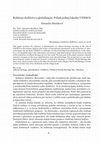
Muzeológia a Kultúrne Dedičstvo, 2014
This paper examines the influence of globalization on cultural heritage, focusing on the role of ... more This paper examines the influence of globalization on cultural heritage, focusing on the role of UNESCO as the primary initiator and creator of international agreements on the protection of cultural heritage. On one hand, UNESCO is a defender of cultural heritage from globalization, on the other, it is a strong global player who determines and enforces individual policies and practices in the field of the protection of cultural heritage all over the world. The first part of this paper examines selected opinions of experts on the issue of globalization and cultural heritage. The second part is a case study presenting the results of empirical research conducted in Vlkolínec, a UNESCO World Heritage Site since 1993, which aimed to analyze the effect the inclusion of the village in the World Heritage List had on the everyday lives of its inhabitants and the village itself.
1. We were impressed by the significant progress in the last four years since the restructure of ... more 1. We were impressed by the significant progress in the last four years since the restructure of doctoral education at the University of Helsinki (UH). We felt that much effort had been on making the new structure work. Now we feel the leadership should become more strategic. They should discuss and plan how to make UH really internationally outstanding in doctoral education i.e. focus on how to make it really special and distinctive. This would help raise profile and attract more high quality international young researchers. The leadership should have oversight of both strategy and quality assurance to ensure a consistent high quality experience. We recommend that a senior academic post be established to lead this agenda. The coordinators are crucial to success and have been doing an excellent job.
Muzeológia a kultúrne dedičstvo, 2021
A large number of studies within the social sciences have been devoted to the relationship betwee... more A large number of studies within the social sciences have been devoted to the relationship between cultural heritage and cultural/ heritage tourism development in recent years and even decades. This area of study has been an object of interest for numerous disciplines, from economics, geography, sociology and history, to ethnology, sociocultural anthropology, museology and cultural studies. The study aims to present selected theories on cultural heritage and heritage tourism based on recent theoretical concepts, and to reflect their implementation within a particular national and regional context based on a case study of the Banská Bystrica Self-Governing Region, Slovakia.
Narodna umjetnost, 2020
This paper deals with the processes of transformation of an urban festival – the Radvaň Fair in t... more This paper deals with the processes of transformation of an urban festival – the Radvaň Fair in the city of Banská Bystrica, Slovakia – in a comprehensive way and from a chronological point of view. The main focus is on the development of the festival in the post-1989 (post-communist) period. The fair has been organised continuously since 1655 and went through a number of transformations. Its function has changed from a primarily commercial event of three centuries to a significant cultural and social hallmark festival in the 21st century. The key research questions concern the role of cultural heritage-based festival in identity building and city marketing, and the relationship between the festival and place (location). The paper also addresses the question of potential use/misuse of cultural heritage in current political discourse and practice.
Czech Sociological Review, 2005
The article deals with the questions of the (in)visibility of women in Slovak political life. The... more The article deals with the questions of the (in)visibility of women in Slovak political life. The material presents statistical data on women's participation in Slovak national, regional and local politics with the support of qualitative data from interviews with women politicians and activists. The author looks at the reasons for the low political representation of women and the unsuccessful attempts to increase it by introducing positive mechanisms such as quotas. The primary focus is put on the representation of women in municipal politics. The author analyses the main reasons why women are more successful in local politics than in 'high' politics.

Slovenský národopis / Slovak Ethnology, 2019
The objective of the study is to offer an overview of selected concepts and approaches to the stu... more The objective of the study is to offer an overview of selected concepts and approaches to the study of the contemporary rural environment and rurality from the perspective of disciplines close to social anthropology (mainly sociology and human geography) on the basis of scientific literature. The study builds on the objectives of the APVV project, introduced in the Editorial of this volume (Socio-cultural capital of successful villages as a source of sustainable development in the Slovak countryside). The selection of theories closely relates to the project and presents those concepts that might bring theoretical-methodological impulses for rural anthropology, but could also be useful for rural municipalities. For better understanding of contemporary theoretical approaches in rural studies, I pay closer attention to key terms “rural” and “rurality”, and further focus on concepts of rural resilience, sustainability, multifunctionality and peripherality.
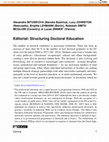
Zeitschrift für Hochschulentwicklung (Journal for Higher Education Development), 2017
The number of doctoral candidates is increasing worldwide. There has been an increase of more tha... more The number of doctoral candidates is increasing worldwide. There has been an increase of more than 60 % in the number of new doctoral graduates in the EU alone over the period 2000 to 2011) (EC, 2014). Students come from a broader mix of entry pathways, educational, occupational, cultural and ethnic backgrounds, creating a more diverse doctoral student body. The doctorate is also evolving and diversifying. Just as research is increasingly inter-connectedcrossing discipline, sector, institutional and national boundarieswe see increasing numbers of joint and group supervision, either where individual universities or faculties are seeking multiple bilateral strategic partnerships with other universities nationally and internationally at the level of doctoral education, or in multi-institutional consortia. We also see a trend towards growth in professional doctorates 2 or doctorates which are
SSRN Electronic Journal, 2003
The special issue on Economic Growth and Innovation in Multicultural Environments (ENGIME) collec... more The special issue on Economic Growth and Innovation in Multicultural Environments (ENGIME) collects a selection of papers presented at the multidisciplinary workshops organised by the ENGIME Network. The ENGIME workshops address the complex relationships between economic growth, innovation and diversity, in the attempt to define the conditions (policy, institutional, regulatory) under which European diversities can promote innovation and economic growth. This batch of papers has been presented at the first ENGIME workshop: Mapping Diversity. ENGIME is financed by the European Commission, Fifth RTD Framework Programme, Key Action Improving SocioEconomic Knowledge Base, and it is coordinated by Fondazione Eni Enrico Mattei (FEEM). Further information is available at www.feem.it\engime.
International Journal of Urban and Regional Research, 1998
… Association for Quality …, 2010
The present report follows an ENQA (European Association for Quality Assurance in Higher Educatio... more The present report follows an ENQA (European Association for Quality Assurance in Higher Education) Workshop on Quality Assurance and Postgraduate Education, hosted by the Romanian Agency for Quality Assurance in Higher Education (ARACIS) in Brasov, Romania on ...
Narodna umjetnost, 2018
The paper focuses on monuments and memorials construction, reconstruction, removal or relocation ... more The paper focuses on monuments and memorials construction, reconstruction, removal or relocation in Slovakia in the context of post-socialist urban development. It focuses on monuments and memorials illustrated by a set of examples and narratives from the city of Banská Bystrica. Monuments are built structures erected to commemorate an event or a person of historical importance. As signifi cant landmarks they are an important part of city-making, but often also carry a political message. The post-socialist reinterpretation of the past, confrontation with the legacy of several political regimes, particularly communism, reveals its traces in the urban landscape of Banská Bystrica and refl ects the constant contestation over urban space and its representations.
Anthropology of East Europe Review, 1998
NA SLOVENSKU, 1992
Page 12. 12 SUSTAINABLE DEVELOPMENT AND DIVERSITY IN SOCIAL SCIENCES: Mapping the Research Field ... more Page 12. 12 SUSTAINABLE DEVELOPMENT AND DIVERSITY IN SOCIAL SCIENCES: Mapping the Research Field Alexandra Bituíková Introduction This paper was written as a part of the Network of Excellence project Sustainable ...
ebos.com.cy
Research project: The relationship between cultural and biological diversity: Lessons about diver... more Research project: The relationship between cultural and biological diversity: Lessons about diversity in a world of change. Johan Colding and Ingela Ternström, Royal Swedish Academy of Sciences, Sweden *** Research project: Organizing Diversities and Interorganizational ...
Anthropological Journal of European Cultures, 2009
The essay deals with the study of regionalism in European social anthropology with the focus on S... more The essay deals with the study of regionalism in European social anthropology with the focus on Slovakia's regions, regional diversities and identities in a broader perspective of European integration and regionalisation. It looks at so-cio-anthropological research on ...

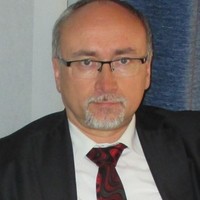


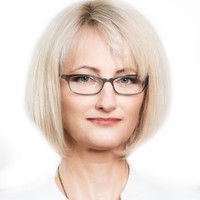

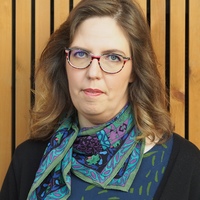


Uploads
Papers by Alexandra Bitusikova